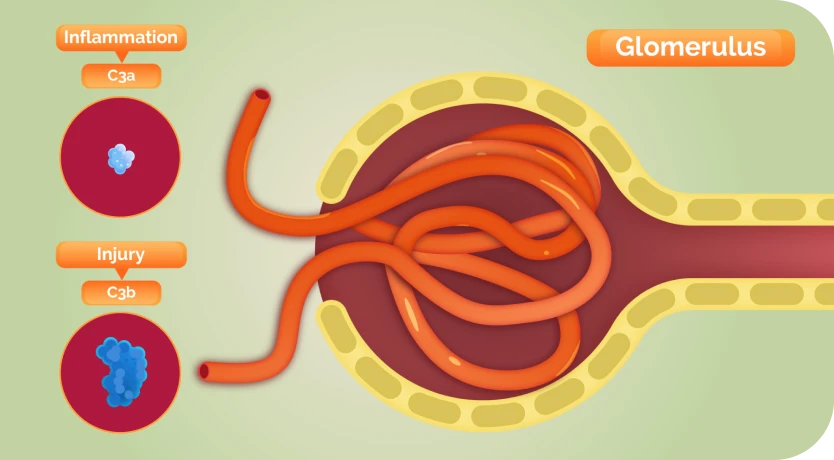Understanding C3G and primary IC-MPGN
The important role of your kidneys
Your kidneys are essential organs that filter your blood, helping to maintain a healthy balance of nutrients and electrolytes.
Your kidneys contain millions of tiny filters called GlomeruliTiny, ball-shaped structures within the kidneys that act as the primary filtering units of the blood.glomeruli. These filters play a critical role in maintaining your body’s health by removing and turning waste, toxins, and excess fluid in your blood into urine, and retaining essential proteins and nutrients.
Actor portrayal.

The impact of C3G or primary IC-MPGN on your body
C3G and primary IC-MPGN are rare kidney diseases that can affect people of all ages. They can lead to serious kidney damage and impact how your kidneys work.
In conditions like C3G and primary IC-MPGN, the glomeruli become targets of inflammation and damage. Over time, they are unable to filter blood effectively.
The Complement systemPart of the immune system made up of a network of proteins that work together to help protect the body from infections, clear out old or damaged cells, and promote inflammation to heal injuries.complement system is part of your immune system and always active. C3G and primary IC-MPGN are caused when it is overactivated. The C3 proteinA protein that plays a central role in the complement system. When the complement system becomes overactive, excessive breakdown of C3 results in inflammation and a buildup of C3 fragments in the kidneys. C3 protein plays a central role in this process. This leads to C3 breakdown fragments in the kidneys—and in the case of primary IC-MPGN, immunoglobulins (also known as antibodies)
The overactivation of the complement system has a gradual, worsening effect on your kidneys
As the complement system stays overactivated, kidney damage continues:
Signs and symptoms of C3G and primary IC-MPGN vary but can include:
Fatigue—A persistent feeling of tiredness that doesn’t go away with rest
Protein in the urine (proteinuria)—This can appear as foamy or bubbly urine and may indicate kidney issues
High blood pressure—Commonly associated with kidney problems and can worsen kidney damage over time
Yellow deposits in the eyes (drusen)—Sometimes visible on an eye exam, these yellow deposits build up under the retina and are made up of fats and proteins
Swelling (edema)—Typically in areas like the hands, feet, or ankles, due to fluid retention
Blood in the urine (hematuria)—Often visible as a reddish or brownish tint, it can signal inflammation in the kidneys
High cholesterol—A condition where there is an excessive amount of cholesterol—a waxy, fat-like substance—in the blood
These symptoms may not always appear together, and they vary in severity from person to person.
C3GA rare kidney disease caused by an overactive complement system, a part of your immune system that normally helps fight infections. In C3G, the complement system mistakenly attacks the kidneys, causing C3 fragments to build up. Over time, this buildup leads to inflammation and kidney damage.C3G and Primary IC-MPGNA rare kidney disease caused by an overactive complement system, a part of your immune system that normally helps fight infections. In primary IC-MPGN, the complement system mistakenly attacks the kidneys, causing immunoglobulin fragments (antibody proteins) or a combination of immunoglobulin and C3 fragments to build up. Over time, this buildup leads to inflammation and kidney damage.primary IC-MPGN are 2 distinct, rare kidney diseases that share similar signs, symptoms, and an underlying cause: complement system overactivation. While they progress in similar ways, their differences are important for diagnosis.
Early conversations can make a difference. Talking to your doctor can help you better understand what’s happening and explore the right next steps for you


